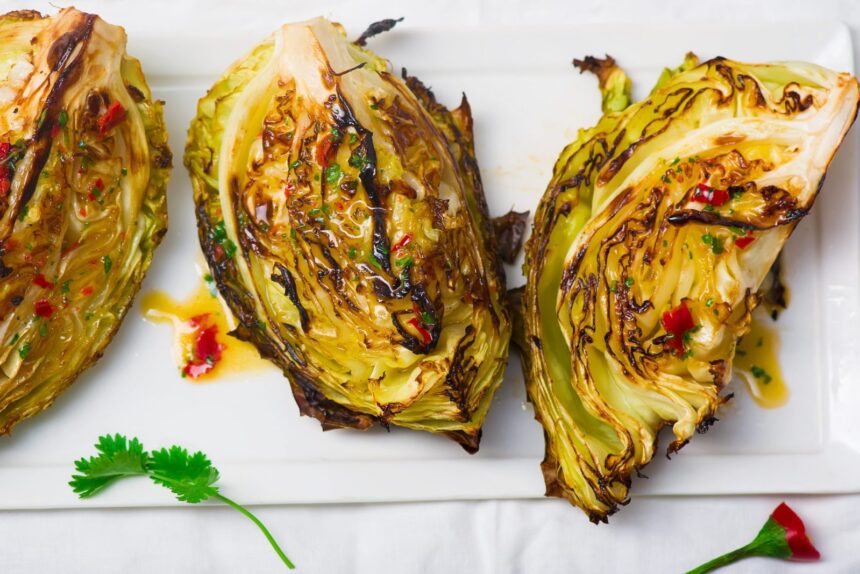
Author Bio
Nicholas Vincent is a passionate environmentalist and freelance writer with a background in environmental studies….
Read More
Move over kale — According to the New York Times, London’s hottest produce trend is Hispi cabbage. Known for its sweet flavor and heart-shaped cone, this humble vegetable has gone from overlooked side dish to the centerpiece of some of the city’s most exciting restaurants. Once dismissed as the boiled-to-death staple of Sunday roasts, Hispi is now being chargrilled, roasted, and dressed up with sauces from around the world.
Chefs say its appeal lies in both taste and practicality. Hispi’s thick, craggy leaves trap sauces and spices, while its compact heart holds up under extreme heat, allowing it to char beautifully on the outside while steaming on the inside. That makes it a forgiving, versatile ingredient that works in everything from smoky grills to creamy curries. Restaurants like Gold in Notting Hill, Hoppers, and Fallow have turned it into a must-order dish, pairing it with flavors as varied as sesame, mushroom XO, and coconut milk curry.
Hispi also has another big advantage: price stability. Unlike trendier imports or short-season vegetables, Hispi grows for much of the year and remains affordable. For chefs worried about supply chain disruptions or rising food costs, it’s a reliable base ingredient that can anchor menus without breaking budgets.
This conical cabbage is now making waves beyond fine dining. It’s showing up in casual lunches, pub roasts, and meal-prep boxes across London. Wholesale distributors report that Hispi sales have surged, with some suppliers noting it now makes up nearly two-thirds of all cabbage sold.
More than just a culinary fad, Hispi highlights a bigger shift in how diners and chefs view vegetables. By celebrating produce once considered plain, London’s kitchens are helping to normalize plant-based dining that is exciting, affordable, and sustainable. That’s good news for the environment and for anyone looking for a greener future for food.
Choosing dishes built around vegetables like Hispi is one simple way to Support sustainability while enjoying the best flavors the season has to offer. Next time you spot it on a menu, skip the meat and give cabbage the spotlight.
Sign These Petitions!
Please sign our latest and most urgent petitions to help the planet. Every signature counts!
Related Content:
Easy Ways to Help the Planet:
- Eat Less Meat: Download Food Monster, the largest plant-based Recipe app on the App Store, to help reduce your environmental footprint, save animals and get healthy. You can also buy a hard or soft copy of our favorite vegan cookbooks.
- Adopt-a-Pet: Visit WildWatchers, a watchdog platform specifically designed for animal, earth, and wildlife warriors to actively give back, rescue, and protect animals and the planet.
- Reduce Your Fast Fashion Footprint: Stand against fast fashion Pollution by supporting circular brands like Tiny Rescue, which create cause-based collections using recycled, zero-waste clothing designed to be returned and remade, ensuring it never ends up in a landfill.
- Shop Sustainably for Your Home: Visit SustaiNOBLE.org, an eco-friendly and ethically sourced home decor store that will empower your home with luxurious fair-trade, and sustainable products made by global artisans.
- Support Independent Media: Being publicly funded gives us a greater chance to continue providing you with high-quality content. Please consider supporting us by donating!
- Sign a Petition: Your voice matters! Help turn petitions into victories by signing the latest list of must-sign petitions to help people, animals, and the planet.
- Stay Informed: Keep up with the latest news and important stories involving animals, the environment, sustainable living, food, health, and human interest topics by subscribing to our newsletter!
- Do What You Can: Reduce waste, plant trees, eat local, travel responsibly, reuse stuff, say no to single-use plastics, recycle, vote smart, switch to cold water laundry, divest from fossil fuels, save water, shop wisely, Donate if you can, grow your food, volunteer, conserve energy, compost, and don’t forget about the microplastics and microbeads lurking in common household and personal care products!



![How to Make Kombucha [Vegan] – One Green Planet](https://top-100-recipes.com/wp-content/uploads/2025/08/kombuchabottles-scaled-150x150.jpg)

![Pull Apart Christmas Tree [Vegan] – One Green Planet](https://top-100-recipes.com/wp-content/uploads/2025/12/xscreen-shot-2019-11-29-at-1-57-39-pm-150x150.png.pagespeed.ic.9pB2mNa6N_.jpg)



